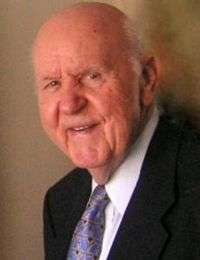J. Sterling Livingston
| J. Sterling Livingston | |
|---|---|
 | |
| Born |
1916 Salt Lake City, Utah |
| Died | 2010 |
| Alma mater |
University of Southern California Harvard University |
| Occupation | Author, Management Consultant |
| Spouse(s) | Ruth E. (Flume) Livingston |
J. Sterling Livingston (June 7, 1916 – February 14, 2010) was a professor at the Harvard Business School following World War II to 1974. Dr. Livingston founded or co-founded a number of leading consulting companies over the course of his business career. He founded Sterling Institute, a management development and consulting firm in 1967 which continues to develop leaders and managers to this day. Dr. Livingston was well known for two classic Harvard Business Review articles, "The Myth of the Well-Educated Manager" and "Pygmalion in Management."
Early life and education
Sterling Livingston was born in Salt Lake City, Utah to the late Julius Edward and Fanny Lucillia (Scott) Livingston on June 7, 1916. He and his four siblings grew up in and around Chino, Glendale and Pomona, California. In 1931 Sterling's mother died and his father, who had abandoned the family, told the oldest daughter, Peg, to put her brothers in an orphanage. Refusing that advice, 18-year-old Peg and her four brothers (Sterling was 14) stayed together and "brought themselves up" during the Great Depression.
Following graduation from Hoover High School, Sterling got a job as wiper on a freighter bound for Shanghai. He did not intend to go to college but his high school debate coach encouraged Sterling to pursue his formal education. Sterling followed that advice and became a debate champion at both Glendale Junior College and later at the University of Southern California where he was the Captain of the 1938 Debate Team and a member of Phi Kappa Tau fraternity. He graduated cum laude in Business Administration from USC in 1938. He was accepted at the Harvard Business School where he graduated in 1940 with High Distinction at the top of his MBA class.
Sterling met Ruth E. Flume on a blind date while he was completing his MBA at Harvard and she was in her Junior year at Wellesley College. He was so smitten by her beauty, intelligence and poise that he proposed on their first date. They were married for 67 years.
Sterling taught the Navy Supply Corps during World War II. He was in charge of writing the Manual of Naval Procurement and became the Navy's youngest Commander.
Following the war, Livingston returned to Harvard where he earned his PhD in Business Administration (DCS) in 1948.
Career
Sterling then became a professor at the Harvard Business School where he taught in the MBA and Doctorate programs for over twenty years. As a professor at the Business School, he taught a multitude of subjects and taught them all well. He was truly a great, great educator. Year after year, he was rated as the best professor by the student body (of all his honors, we think he was most proud of this). Two of his articles, "The Myth of the Well Educated Manager" and "Pygmalion in Management", were published by the Harvard Business Review and remain amongst their best sellers.
Despite his many honors and achievements, Sterling didn't much care for accolades or resting on his laurels. He was an entrepreneur, through and through, always interested in the new, new thing. He was at the forefront in everything he pursued. He founded or co-founded a number of companies, including Harbridge House, a management consulting firm that started in Harvard Square and moved to Arlington Street in Boston, consulting often for the Defense Department.
In the early 1960s, he was brought in by Paul R. Ignatius and Defense Secretary Robert McNamara to help launch the Logistics Management Institute, a nonprofit set up to advise defense officials. The Sterling Institute which he founded in 1967 continues his legacy of developing managers and leaders in both the public and private sectors.
He died at the age of 93 in Bolton, Massachusetts.